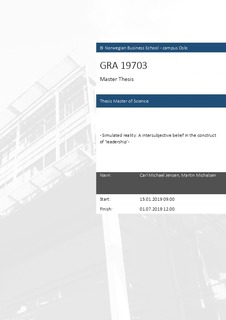Simulated reality: A intersubjective belief in the construct of ‘leadership’-
Master thesis
Permanent lenke
http://hdl.handle.net/11250/2626253Utgivelsesdato
2019Metadata
Vis full innførselSamlinger
- Master of Science [1621]
Sammendrag
This thesis will investigate the construct of ‘leadership’ from a social
constructivism perspective. Which interpretations does this construct have, and
does the meanings given to the construct differ from an academician point of view
compared to the practical thoughts among people in general? We know this is a
topic undergoing constant research, and in the eyes of social constructivism
‘leadership’ can be seen as a construct created in the imagination of social scientists
(Michell, 2013). This paper addresses the research question: “Which meanings are
appointed to the construct of ‘leadership’ through its definitions, and to what
degree does intersubjectivity play a role on its acceptance?”
A systematized literature review (Grant and Both, 2009) is conducted,
focusing on gathering definitions from the most cited literature on leadership. From
the systemized review, 30 definitions on ‘leadership’ were extracted. These
definitions gathered shows the diverging meanings given to leadership by
academics, however, this is not new findings, referring to Stogdill (1974). We
further conducted ten semi-structured interviews on randomly selected people in
Oslo. Answers showed that people interpret ‘leadership’ differently. There is also
difference between academical definitions and everyday people’s interpretation of
the construct. When it comes to the acceptance of social constructs, we conclude
that it seems that we have created an intersubjective network which believes in
‘leadership’. Intersubjectivity states that our social reality is created through
interactions and a mutual subjective shared agreement towards social phenomenon.
It offers further interesting areas of research on the mediating role of
intersubjectivity to the acceptant of social constructs.
Beskrivelse
Masteroppgave(MSc) in Master of Science in Leadership and Organizational Psychology - Handelshøyskolen BI, 2019
